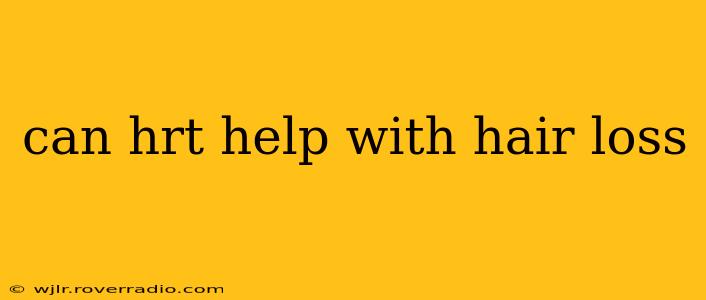Hair loss, or alopecia, is a distressing condition affecting millions, and its causes are multifaceted. Hormonal imbalances frequently play a significant role, making Hormone Replacement Therapy (HRT) a topic of considerable interest for those experiencing hair thinning or shedding. While HRT can be beneficial in some cases, it's crucial to understand its complexities and limitations regarding hair loss. This article will delve into the relationship between HRT and hair loss, addressing common questions and misconceptions.
What is Hormone Replacement Therapy (HRT)?
HRT is a medical treatment designed to replace hormones that are declining due to aging (primarily menopause in women) or certain medical conditions. It typically involves the administration of estrogen, progesterone, and sometimes testosterone, aiming to alleviate symptoms associated with hormonal deficiency. These symptoms can range from hot flashes and night sweats to vaginal dryness and decreased libido. The specific hormones and dosages are tailored to individual needs and medical history, determined through consultation with a healthcare professional.
Can HRT Help with Hair Loss Caused by Hormonal Imbalances?
The answer isn't a simple yes or no. HRT can potentially help with hair loss in certain situations, particularly in women experiencing androgenetic alopecia (female pattern hair loss) related to menopause. During menopause, decreasing estrogen levels can lead to an imbalance in androgen hormones, like dihydrotestosterone (DHT), which can contribute to hair thinning. Replacing estrogen through HRT may help restore this hormonal balance, potentially stimulating hair regrowth or slowing further loss.
However, it's important to note that HRT doesn't work for everyone. The effectiveness of HRT in treating hair loss depends on several factors, including:
- The underlying cause of hair loss: If hair loss is due to other factors, such as stress, nutritional deficiencies, or autoimmune diseases, HRT is unlikely to be effective.
- The individual's response to HRT: Some women respond well to HRT, experiencing improved hair growth, while others see little to no change.
- The type of HRT: Different types and dosages of HRT may have varying effects on hair growth.
Does HRT Cause Hair Loss?
While HRT can potentially help hair loss in some women, it's also worth noting that it can, in rare cases, contribute to hair loss in others. This is often associated with specific types of HRT or individual reactions. It's essential to discuss any concerns about hair loss with a doctor before starting or continuing HRT.
What are the Side Effects of HRT?
Like any medical treatment, HRT carries potential side effects, which can vary depending on the individual and the type of HRT used. These can include:
- Breast tenderness
- Bloating
- Mood changes
- Headaches
- Increased risk of blood clots (in some cases)
It's crucial to discuss these risks and benefits openly with your healthcare provider before making any decisions about HRT.
What other Treatments are available for Hair Loss?
Besides HRT, various other treatments for hair loss exist, including:
- Minoxidil (Rogaine): A topical medication applied directly to the scalp.
- Finasteride (Propecia): An oral medication for men, although research is ongoing regarding its use in women.
- Hair transplant surgery: A surgical procedure to move hair follicles from one area of the scalp to another.
- Low-level laser therapy (LLLT): A non-invasive treatment using low-level lasers to stimulate hair growth.
- Changes in diet and lifestyle: Addressing nutritional deficiencies and managing stress can also positively impact hair health.
Can I use HRT for hair loss prevention?
While HRT might help address hair loss related to hormonal imbalances, it's not typically used solely for hair loss prevention. Its primary purpose is to manage symptoms associated with hormonal deficiency. If hair loss prevention is your primary concern, discuss other treatment options with your doctor.
Conclusion:
The relationship between HRT and hair loss is complex and not always straightforward. HRT can be beneficial for some women experiencing hormone-related hair loss, but it's not a guaranteed solution, and it's essential to carefully weigh the potential benefits and risks. Always consult with a healthcare professional to determine the most appropriate course of action for your individual circumstances and hair loss concerns. They can assess the underlying causes of your hair loss and recommend the most effective treatment plan. Remember, a comprehensive approach that considers overall health and lifestyle factors is often the most successful strategy for managing hair loss.
